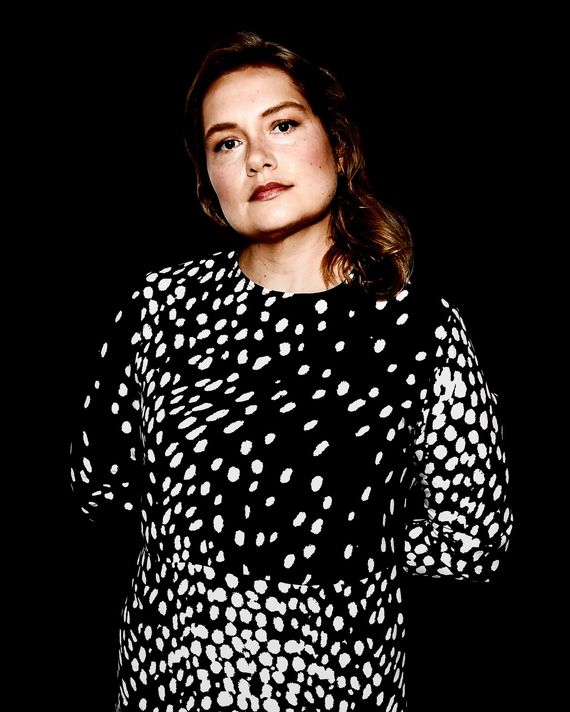
By any measure, actor Merritt Wever is fantastic at her job. She’s won two Emmys for her roles in Nurse Jackie and Godless and been nominated for another. She plays Detective Karen Duvall in the new Netflix series Unbelievable opposite Toni Collette, and it’s among Wever’s best work to date — she is by turns ramrod stern, endlessly compassionate, dedicated, confident, questioning, self-berating, and meticulously professional. But talking about all of this superb acting is making Wever miserable.
“I am working very hard on finding a way to somehow make it less tortuous,” she says, on a recent walk in Prospect Park, during which she is repeatedly, deeply apologetic about the heat. It is more than 90 degrees in Brooklyn today, and she’s the one who suggested we take a stroll. Every time we turn onto a pathway with no shade, she is full of self-recrimination. But she does not want to be mistaken. “I know how lucky I am. And that’s why I’m so nervous about bombing this opportunity.”
Unbelievable is a more “active” role for Wever, as she puts it. She and Collette play detectives working ceaselessly to track down a serial rapist. Her earlier characters may have been “doing something,” but she often felt they were designed to react to others. Still, Wever is adamant that Detective Duvall is not the lead of Unbelievable, that the “heart” of the show belongs to Kaitlyn Dever, who plays a young woman whose rapist was never caught because police decided she made the story up. But if Dever is the heart, Wever and Collette are Unbelievable’s twin motors. The show, which carefully dismantles the institutional, exploitative, male-coded politics that define most crime shows, is fueled by their competence and simmering fury.
Pushing focus away from her central role in Unbelievable is also, of course, a way to deflect attention. The spotlight does not come easily to Wever, though her discomfort with it is endearing rather than gruff. When she won her first Emmy in 2013, her entire acceptance speech was 18 words: “Thank you so — oh no! Thanks so much. Um, thank you so much. Um, I gotta go. Bye.” “My mind went blank,” she told me. “There wasn’t anything else that I was capable of, I promise you that.” And then, because I asked her about the Emmys speech, she half-laughs and half-groans, “I am so unhappy right now.”
I try to distract from how intensely I can see that Wever hates talking about herself. It never works. “I can’t pretend that there’s a large part of me that actually wants to divulge anything,” she tells me. “Conversation is easiest when you’re being honest. I’m hesitant of being completely honest, because I all of a sudden got this vision of a strong wind blowing leaves off the tree, and I’m like, Things are leaving and I can’t get them back!”
She fears that if she explains her process out loud, that suddenly her skill will evaporate. “I don’t think I’m a suspicious person, but I don’t trust that it will always be there when I need it to be, and therefore, I’m scared,” she explains. “Is this conversation going to give it away, and then it won’t be there for me in two weeks when I need to go to work?” Nonetheless, she is remarkably forthcoming about how much terror and stress and anxiety she feels about her job. “Selfishly, it just doesn’t make sense to work this hard for decades and then be so racked every time,” she says. “It just doesn’t make sense and it’s just not worth it and it’s so fucking unpleasant and it honestly gets in the way of work. This is supposed to be a good thing.”
It’s like walking around next to an exposed nerve. At one point, I ask whether she worries that a role like Unbelievable will only bring her increased attention. She says she tries not to think about it, much like she tries not to imagine the kinds of roles it might open up for her. “I am not a dreamer,” she says. “Wouldn’t it be lovely to be in the moment so much that I don’t even comprehend what the idea of dreaming is? I’ve tried to become more like that because I’m told that’s the path to enlightenment, clarity. Just goddamn basic survival.” But she hasn’t really succeeded, because no matter what either of us say, she can’t forget that she’s walking around with me while I ask her questions.
Sometimes, when she’s acting and it’s going well, she does manage to escape her constant self-awareness. “It is a feeling that is close to divine, spacious freedom. You know when you’re in the moment and it actually feels honest or true,” she tells me. “That feels almost divinely spiritually fulfilling to me.” The problem is what happens next: “It leaves.”
“I fear I may be constitutionally incompatible with my job sometimes,” she concludes, near the end of our walk. It must be a real mindfuck to wonder if you’re constitutionally incompatible with a job you’re really good at, I point out. “Thank you for the hidden compliment at the end of that sentence,” Wever replies, “but I found all of my life to be a mindfuck. And the truth is, it wouldn’t matter if I didn’t want to be desperately good at my job.
“It’s a strange thing, this job,” she continues. “You’re trying to find a way to be as human as you can at every second in very inhuman circumstances.”
Eventually, finally, we walk out of the park. “Hey,” she says, just as we start to head in separate directions. “Thanks for your patience. Sorry for the fucking 90-degree walk. Real ridiculous idea. It’s over. You wore breathable fabric and I’m happy for you. I’ll be fine. Don’t worry about me.”





